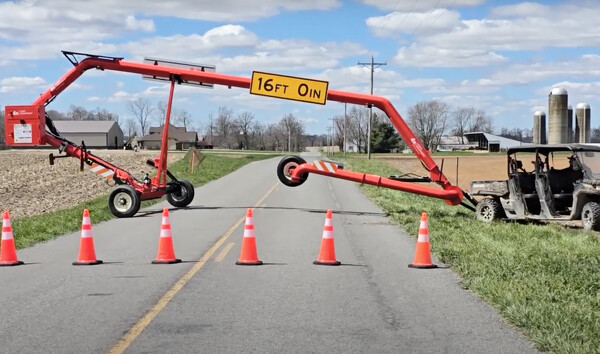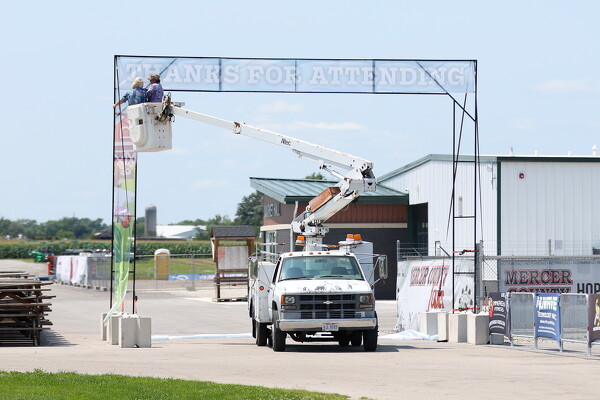Thursday, August 7th, 2025
County loan to help business transform poultry barn
By William Kincaid

Submitted Photo
Fort Equipment manufactures the Pipe Bridge, a device for connecting manure hoses across roads. Fort Equipment video screenshot
CELINA - A Fort Recovery entrepreneur whose chicken flock was wiped out amid the bird flu epidemic is now repurposing his poultry barn into a machine shop to do in-house work related to one of his numerous businesses, Fort Equipment.
The Mercer County Commissioners agreed to issue a $125,000 revolving loan to Fort Equipment LLC for the purchase of equipment at 3138 Wabash Road, Fort Recovery. Greg Fortkamp is the owner of Fort Equipment, as well as Fortkamp Foam and Fort Plastics.
The action was taken following a state-mandated public hearing conducted by Mercer County community development director Jared Ebbing. The seven-year revolving loan bears 3% interest.
Fortkamp aims to turn his 14,640-square-foot poultry barn into a machine shop, Ebbing said.
The total project is estimated at $686,100 and will be bankrolled with the county's $125,000 loan, $31,805 in equity and $529,295 from a private lender. As part of the county agreement, Fort Equipment will create four full-time equivalent jobs, of which three will be offered to low-to-moderate income persons.
"In February of this year, he (Fortkamp) was one of many that was hit by bird flu and had to cull his flock, and that was devastating to him," Ebbing told The Daily Standard.
Rather than eventually putting together a new flock, Fortkamp decided to transform the poultry barn into a machine shop to complete work that he currently outsources to a fabrication shop in Jay County, Indiana.
"The entrepreneur spirit in Mercer County is alive and well," Ebbing said about Fortkamp. "When life hands you lemons, make some lemonade out of it - the epitome of what he is doing and has been doing."
Dedicated to innovative farming solutions, Fort Equipment makes numerous products, including the Disc Manure Applicator, which was engineered to solve the limitations of traditional discs, and Pipe Bridge.
The Pipe Bridge was devised to streamline liquid manure handling, allowing users to effortlessly connect manure hoses across roads, according to Fort Equipment's website. Both foldable and transportable, Pipe Bridge can clear up to three full-size trucks with a maximum flat height clearance of 20 feet.
Ebbing said the product is used to pump manure from an ag-lagoon to a farm field.
"One of the challenges of that is … (for a) field further away from a lagoon, they a lot of times have to … find a culvert pipe to put that (flexible hose) underneath," Ebbing said. "You can't drive over that flexible (hose) to pump out the lagoons."
Fortkamp came up with a solution to the dilemma: Pipe Bridge. A wireless remote is used to control the hydraulics and elevate the bridge over a road. Users then attach liquid manure hoses to The Pipe Bridge to transport the manure across the road without interrupting traffic flow.
"It basically expands the right-of-way and it gets up and over and plenty of height for vehicles to go underneath," Ebbing noted. "So he patented that, and he makes those, and a lot of the fabrication work, or the machining work, he was having (outsourced) to a machine shop in Indiana."
Fortkamp now plans to complete that work in-house in the repurposed poultry barn.
"So he's been retrofitting that barn into a machine shop, and he's buying equipment. It's nearly a $700,000 project," Ebbing said with excitement. "He's already had people ready to be hired, so the job creation, I think, will happen soon, and the renovations are going to proceed, and the equipment purchases are going to proceed."
The $125,000 county revolving loan will be applied to the equipment purchase, Ebbing added.
"A good guy, a good, hard worker, and he came to us with the loan (request) and these are the types of projects we like, that entrepreneurial spirit. Create more jobs and bring manufacturing back to Ohio," Ebbing said.
The county revolving loan program is seeded by grants from the U.S. Department of Housing and Urban Development that are funneled through the state. The local economic development office reviews, approves and distributes the funding.
The low-interest county revolving loans can be used to buy fixed assets such as land, buildings, machinery and equipment and also as working capital to expand an existing or startup business.
Unless used for local infrastructure needs or the removal of blight and slum, the loans are repaid with interest to provide for future loans.


